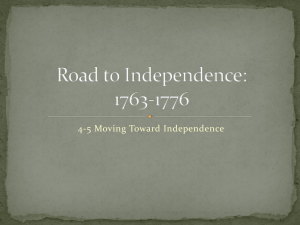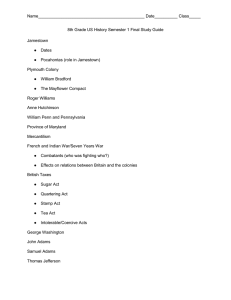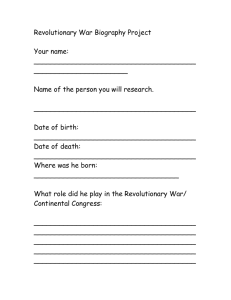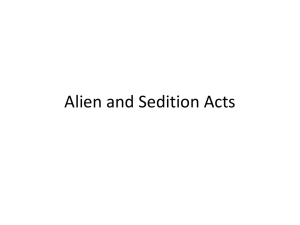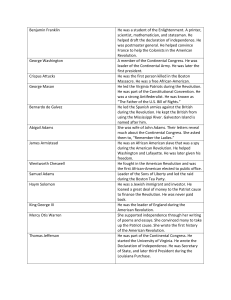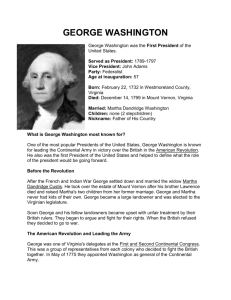Freedom of Expression - Com. 3070 Study Guide I. Adams, Sam As
advertisement
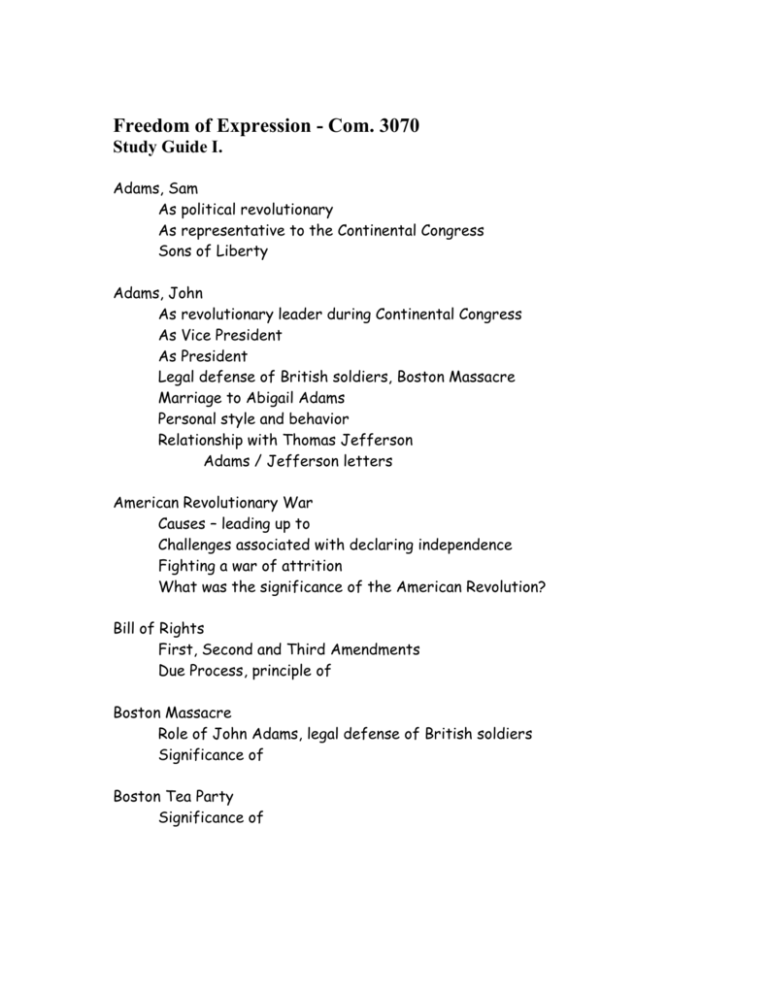
Freedom of Expression - Com. 3070 Study Guide I. Adams, Sam As political revolutionary As representative to the Continental Congress Sons of Liberty Adams, John As revolutionary leader during Continental Congress As Vice President As President Legal defense of British soldiers, Boston Massacre Marriage to Abigail Adams Personal style and behavior Relationship with Thomas Jefferson Adams / Jefferson letters American Revolutionary War Causes – leading up to Challenges associated with declaring independence Fighting a war of attrition What was the significance of the American Revolution? Bill of Rights First, Second and Third Amendments Due Process, principle of Boston Massacre Role of John Adams, legal defense of British soldiers Significance of Boston Tea Party Significance of Continental Congress, I. II. & III. Purpose of the various meetings Role of John Dickinson, representative from Pennsylvania Role of Richard Henry Lee, representative from Virginia Declaration of Independence Thomas Jefferson It’s main purpose and later significance Jefferson’s approach in creating the document Federalists v. Democratic Republicans, difference in philosophy First Amendment Reason for its Creation Five Stated Freedoms Implied Rights Founding of the American republic A paradox of principles: Slavery considerations The need for compromise between north and south France As U.S. ally during the American revolution Impact of the American revolution on the French revolution Franklin, Benjamin As scientist and statesman Role in Continental Congress Role of values; importance of compromise French Revolution As a contrast to the American Revolutionary War Great Britain View toward the American colonies Reasons for passing the Sugar and Stamp Acts Hamilton, Alexander As secretary of the Treasury Decision to relocate the U.S. capital to Washington Differences between himself and Thomas Jefferson Duel with Aaron Burr Support of Federalist position Hancock, John As Boston merchant Relationship with Sam Adams As signer of the Declaration of Independence Jefferson, Thomas As Minister to France following the American Revolutionary war As Secretary of State under George Washington As Vice President under John Adams As 3rd President of the U.S. • Orchestrated the Louisiana Purchase Drafting the Declaration of Independence Founder of the University of Virginia Renaissance man Relationship with John Adams Adams / Jefferson letters Relationship with Alexander Hamilton Lexington and Concord, Battles of, Significance Madison, James As colleague and protégé of Thomas Jefferson U.S. Constitution Bill of Rights Paine, Thomas Common Sense, significance of Prior restraint, principle of Republic, definition of Scandals Sally Hemmings Maria Reynolds Separation of church and state, reasons for Establishment clause Role of Thomas Jefferson, 1802 Sources of the Law • Constitutional Law • Statutory Law • Administrative Law • Common Law Theories of Free Speech Locke, John, Natural rights theory Milton, John, Marketplace theory Meiklejohn, Alexander, Self government theory U.S. Constitution Madison, James Ratifying the Constitution Separation of Powers, reasons for Branches of the Government • Legislative • Executive • Judicial Washington, George as military commander and 1st President of the U.S. foreign policy position – toward Britain and France Yorktown, Battle of, significance of Zenger, John Peter Significance of trial and outcome Important Dates: April 19, 1775 July 4, 1776 1775 – 1781 1787 July 4, 1826 Readings: Please review main points of assigned readings

